Key takeaways:
- Influencer collaborations thrive on authenticity, fostering genuine connections between brands and consumers, which can lead to innovative marketing strategies.
- Selecting influencers aligned with brand values and assessing audience engagement is crucial for successful marketing campaigns.
- Creative synergies during collaborations can enhance brand storytelling and create memorable consumer experiences.
- Engagement metrics often outweigh follower counts, highlighting the importance of connecting with the right audience for effective marketing results.
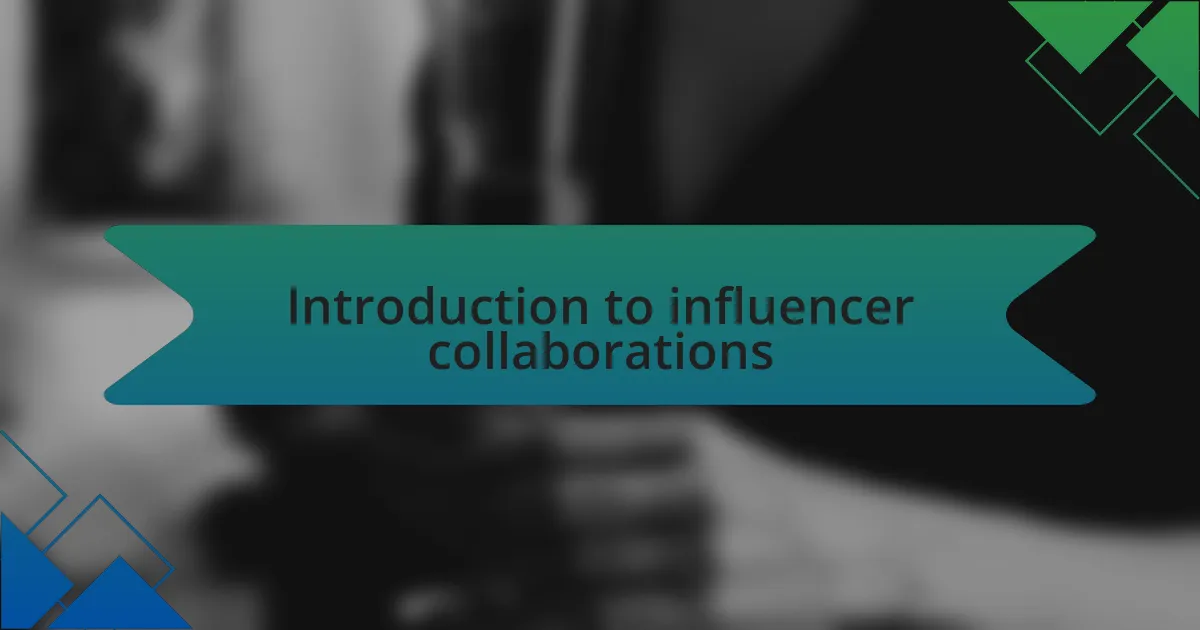
Introduction to influencer collaborations
Influencer collaborations have transformed the way brands connect with their audience, especially in niche markets like gin. I still remember my first experience reaching out to a local gin influencer; it felt like stepping into uncharted territory. The idea of having someone with a loyal following showcase our product was both exhilarating and intimidating.
As I delved deeper into influencer marketing, I realized it’s not just about pairing with someone who has a large following; it’s also about authenticity. I once worked with a micro-influencer who had only a few thousand followers, yet her content was genuine and resonated with her audience, leading to fantastic engagement. What struck me was how her passion for craft gin mirrored ours, creating an organic partnership that felt more like a friendship than a business transaction.
Looking back, I often wonder how these collaborations can sometimes feel daunting but are incredibly rewarding. The connections formed during these partnerships can lead to innovative content and fresh perspectives that revitalized our marketing strategy. Have you ever considered how a shared vision can fuel creativity between brands and influencers? It’s not just about sales; it’s about cultivating a community.
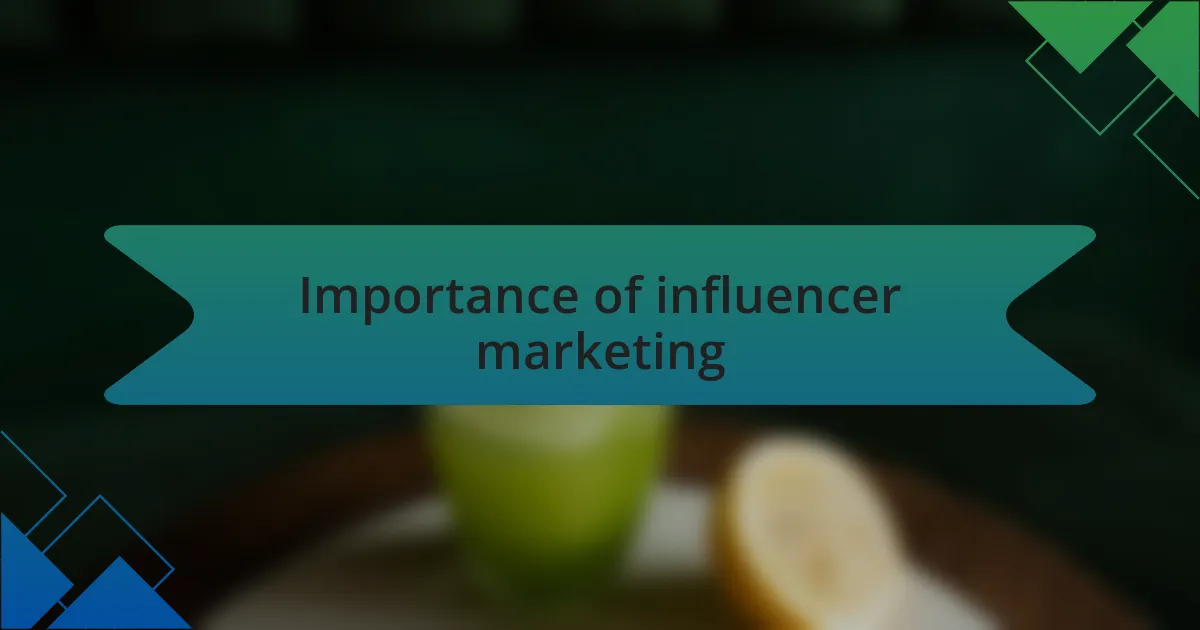
Importance of influencer marketing
Influencer marketing holds immense importance in today’s digital landscape, especially in niche markets like gin. When I first teamed up with a popular gin aficionado, I was surprised by the genuine buzz it created within her community. Her authentic endorsement of our brand amplified our reach and credibility, demonstrating how the right influencer can serve as a powerful advocate, bridging the gap between product and consumer.
What truly stands out about influencer marketing is how it thrives on trust. I recall an occasion when a well-respected influencer shared not just our product but also her personal story of discovering craft gin at a local distillery. This narrative struck a chord, inspiring her followers to explore our offerings themselves. It made me realize that consumers today value relationships over mere transactions, demanding authenticity from the brands they support.
Moreover, influencer collaborations often lead to creative synergies that I never anticipated. During a campaign brainstorming session, I just happened to share an idea I had for a cocktail competition. The influencer loved it, and together we crafted an event that not only showcased our product but also engaged her audience in an interactive, fun way. Have you ever thought about how these partnerships can spark innovative ideas and experiences? It’s truly eye-opening to see how collaboration can foster a vibrant community around a shared passion for gin.

Overview of gin marketing strategies
Gin marketing strategies have evolved significantly, leveraging various channels to cultivate brand loyalty and consumer engagement. In my experience, the most effective approach has often been building a strong narrative around the gin’s origin, ingredients, and craftsmanship. For instance, sharing the story of how our distillery sources local botanicals not only educates consumers but also connects them emotionally to the brand. Have you ever found yourself more invested in a product because of its backstory?
Another essential strategy involves creating engaging content that resonates with our target audience. I remember collaborating on a social media campaign where we invited our followers to share their own gin cocktail recipes. This not only boosted community participation but also gave us valuable insights into customer preferences. The joy of engaging directly with consumers is palpable; it fosters a sense of belonging and ownership over the brand. Don’t you think that creating a two-way dialogue enriches the consumer experience?
Lastly, I’ve found that hosting events, whether virtual tastings or local pop-ups, amplifies our marketing efforts. I once organized a gin and food pairing event, where attendees explored how different gins complement various dishes. The energy in the room was electric, and the feedback we received was overwhelmingly positive. There’s something magical about bringing people together to share experiences—doesn’t it make you see the potential of experiential marketing in a new light?
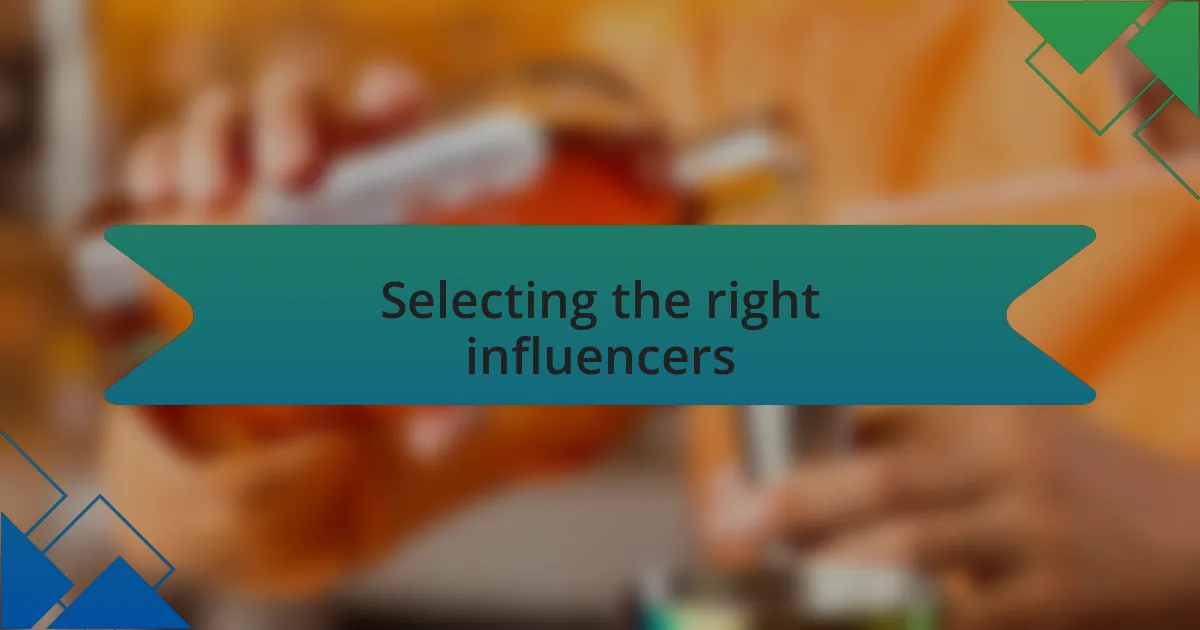
Selecting the right influencers
When selecting the right influencers for gin marketing, I’ve learned that alignment with your brand values is paramount. I recall an instance where I chose an influencer who genuinely loved and understood craft spirits; their authenticity made their endorsement feel real. Can you imagine how much more powerful a campaign becomes when the influencer truly believes in the product they’re promoting?
I often evaluate an influencer’s audience demographics and engagement rates to ensure we reach our target market effectively. One time, I partnered with an influencer known for their mixology skills, and their followers were not only gin enthusiasts but also eager to learn about the art of cocktail-making. This synergy brought our brand into a vibrant community eager for innovative gin experiences. Doesn’t it make sense to collaborate with someone whose audience will genuinely appreciate what you offer?
Moreover, I regularly assess influencers’ past collaborations to gauge their effectiveness. I once passed on a popular influencer who had a tendency to promote multiple brands of spirits; I felt their messages might lack sincerity. In my experience, genuine connections often yield the best results—after all, wouldn’t you prefer to receive recommendations from someone you trust?
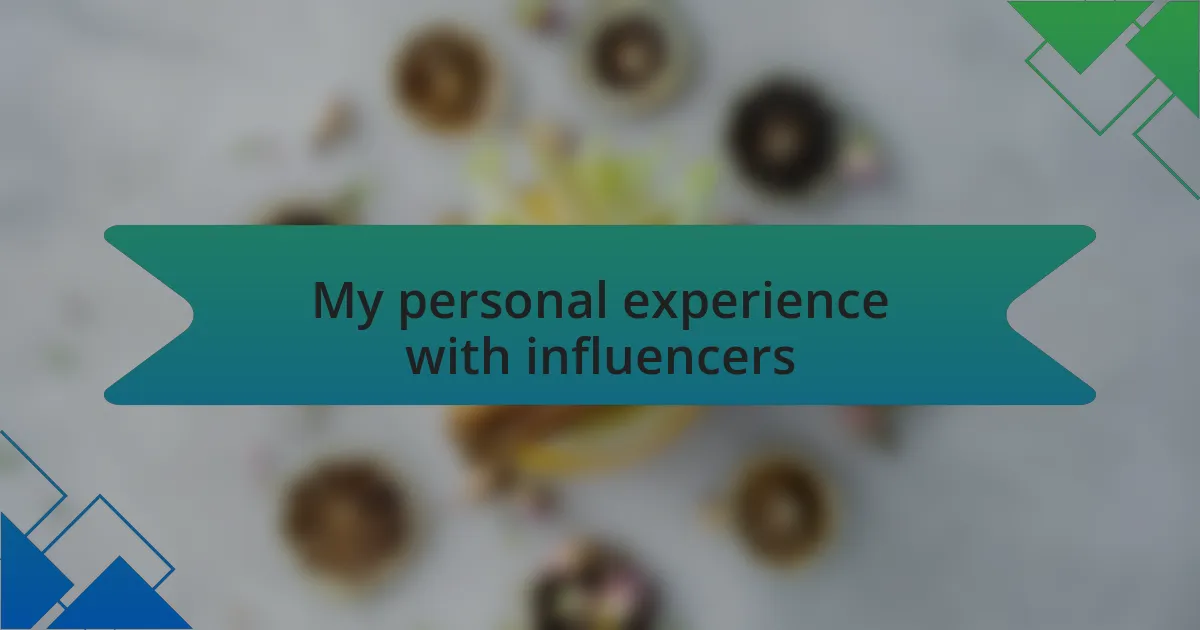
My personal experience with influencers
Working with influencers has been a diverse journey for me. One collaboration stands out vividly: I teamed up with an up-and-coming mixologist who not only shared stunning cocktail recipes but also had a unique storytelling approach. Watching her create a cocktail inspired by our gin and narrate the story behind its ingredients was a reminder of how personal connections can elevate a product’s appeal. Doesn’t it make you realize how much storytelling can enhance a brand’s personality?
On another occasion, I engaged with a lifestyle influencer whose aesthetic fit perfectly with our brand’s image. The final video they produced wasn’t just a promotion; it felt like an art piece that showcased our gin in a captivating scene. The number of shares and comments confirmed what I already knew: an influencer’s creativity can turn a simple advertisement into something memorable. Have you ever seen a campaign that felt more like a piece of art than a sales pitch?
However, not every experience has been smooth sailing. I once collaborated with an influencer who, despite having a large following, failed to connect with our brand’s identity. Their lack of enthusiasm during the campaign was palpable, leading to lackluster engagement. This taught me a valuable lesson about the importance of chemistry between the influencer and the brand. Isn’t it fascinating how crucial that connection is to the success of any collaboration?
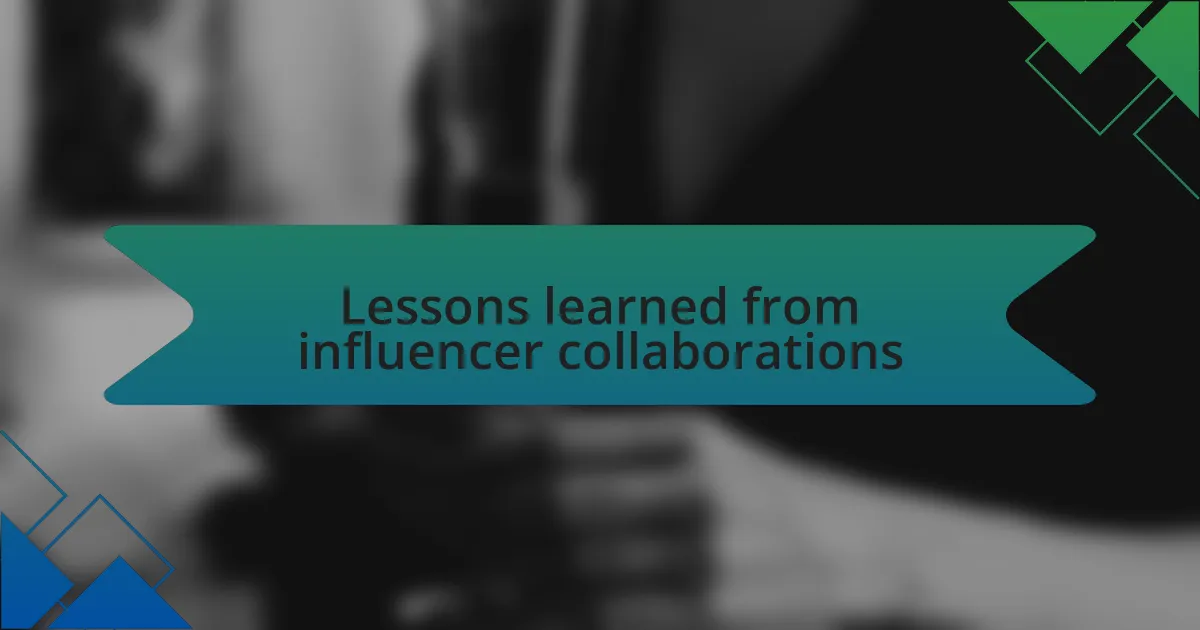
Lessons learned from influencer collaborations
Engaging with influencers has taught me that authenticity is key. I remember one campaign where the influencer genuinely loved our gin, and it showed in every post. Their enthusiasm resonated with their audience, resulting in a spike in our sales that I hadn’t anticipated. Don’t you think that genuine passion is what people are really drawn to?
Another lesson came from a collaboration that initially seemed promising but quickly turned disappointing. The influencer’s approach was too sales-focused, and it felt forced. As a result, the audience didn’t respond as we had hoped. This experience reinforced the idea that sincerity beats strategy; people can sense when something is off. Have you ever felt that disconnect with a brand or a promotion?
Perhaps one of the most profound insights I gained was the importance of engagement metrics over follower counts. During a partnership with an influencer who had a smaller following but higher engagement rates, we saw extraordinary results. It made me reflect on how sometimes, the right audience matters more than sheer numbers. Isn’t it intriguing how targeting the right community can lead to unexpected success?